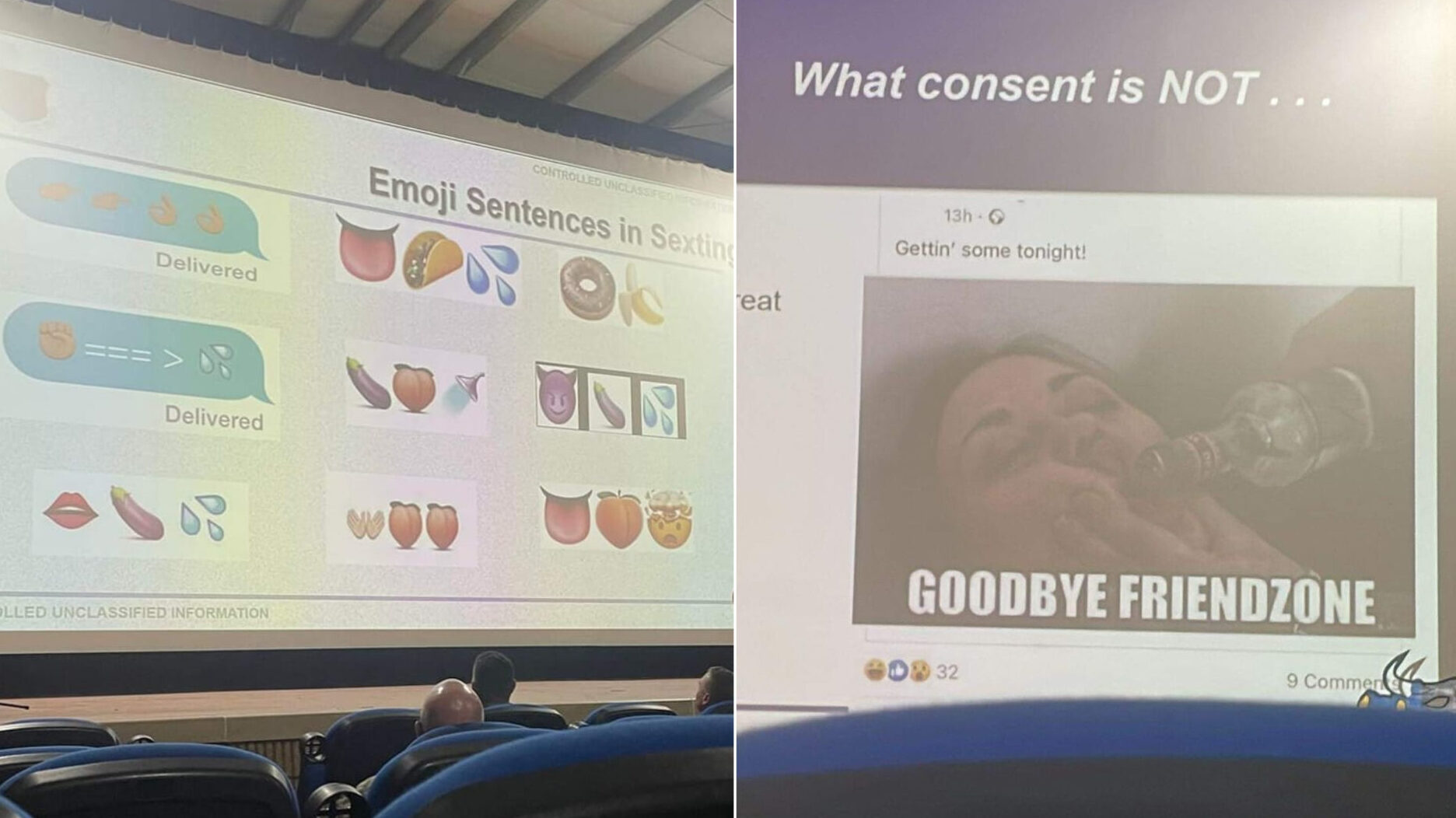

With reports of sexual harassment and assault on the rise in the U.S. military, one branch has resorted to breaking it down Barney-style to get a message of prevention across to its members.
A pair of Air Force slides showing “emoji sentences in sexting” and an image of an unconscious woman being force-fed alcohol accompanied by the phrase “Goodbye Friendzone” are apparently now part of the mandated sexual harassment and assault prevention training provided at Al Udeid Air Base in Qatar, an Air Force spokesman said.

The slides, which first showed up publicly on the popular unofficial Facebook page Air Force amn/nco/snco in late October and appear labeled “controlled unclassified information,” are ”from the mandated Sexual Harassment/Sexual Assault training that our Equal Opportunity office provides,” Lt. Bayard Lewis, public affairs chief for the 379th Air Expeditionary Wing at Al Udeid, told Task & Purpose via email.
Subscribe to Task & Purpose Today. Get the latest military news, entertainment, and gear in your inbox daily.
The goal of the slide featuring the emojis “is to make members and their command aware of messages that could be sent via group chats in hopes of making them knowledgeable/aware of the potential meaning,” Lewis explained. “That way, if a member comes to them stating they were sexually harassed by receiving said emojis, then appropriate action can be taken.”

“The image with a woman having alcohol poured in her mouth was a Sexual Assault Prevention and Response (SAPR) slide used at a training requested by a unit on the base,” he continued. “The point of the slide was to share ‘what does not constitute consent.’”
Both slides were intended for “educational” purposes, Bayard said.
Sexual harassment and assault are a worsening problem in the ranks of the U.S. military, with more than 8% of female service members reporting experiencing unwanted sexual contact in 2021 — the highest rate since the Defense Department began tracking such reports back in 2004, per Military Times.
The increase in sexual harassment and assault has become more acute in the ranks of the Air Force. According to a 2020 report, the number of sexual assault reports in service jumped 9% over the previous year to the “greatest number of reports” since the launch of the service’s branch-specific SAPR program in 2005.
The following year, an Air Force study revealed that one out of every three female airmen surveyed said they had experienced sexual harassment at some point during their military career.
The use of emojis and memes in the Al Udeid slides isn’t the first time the service has turned to the language of the internet as an educational tool to help articulate a complex topic to its members.
In 2019, a threat brief at Joint Base Andrews in Maryland regarding an “increase in nationwide activity” by self-described “incels” — members of a misogynist online subculture of “involuntary celibacy” — used a meme known as “Becky vs. Stacy” to describe incels’ skewed perception of women.
“The intent of the brief was to educate the Joint Base Andrews commanders on the behaviors and activities attributed to the group to safeguard our Airmen/installation,” an 11th Wing spokesman told Task & Purpose at the time.
And the Air Force isn’t the only branch discussing how emojis are related to sexual harassment in particular: photos published in the Defense Visual Information Distribution Service in April showed U.S. Army Central soldiers attending a SAPR briefing at Shaw Air Force Base in South Carolina featuring similar slides.
With the Air Force facing the most challenging military recruitment environment in decades alongside its sister branches, the service is aggressively pursuing new and novel forms of communication to reach new recruits and retain existing airmen.
“Recruiters are using social media, especially YouTube, to trigger interest and introduce people to the service at a time when public awareness — and direct connections — to the military are at all-time lows,” as the service said in a statement in early September.
Unfortunately, the inclusion of emojis into official Air Force materials may end up backfiring: members of Gen Z — the U.S. military’s favorite new demographic target — reportedly find emojis deeply uncool and even passive-aggressive.
And with prospective Gen Z recruits increasingly concerned with the U.S. military’s reputation regarding sexual harassment, assault, and suicide, the service might consider scrapping these slides for something a bit more substantive. Or at least get better memes.
The latest on Task & Purpose
- The Navy’s most advanced aircraft carrier is officially flying a brand new battle flag at sea
- Video shows alleged Ukrainian drone swarm attack on Russian warships in Crimea
- We salute the USS Daniel Inouye for flying its badass battle flag on the way into port
- This Army video shows how much Ranger School has changed in 70 years
- We salute this F-15 fighter jet for rocking the most ‘Murica paint job ever
Want to write for Task & Purpose? Click here. Or check out the latest stories on our homepage.